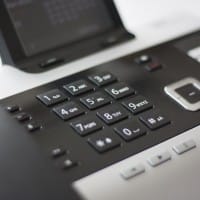Telephone Line Fraud – Who Has Your Number?


Recently, a prominent small business client contacted me expressing anger, aggravation, fear and frustration with their local telephone service Provider. It seems that about a year earlier, long distance charges totaling over $80,000.00 suddenly appeared on their telephone bill. These charges related to a huge number of international calls made from their phone line on 3 specific dates to several African countries.The problem, of course, was that the client did not make the calls, had no business in Africa, and knew no one there. To make matters worse, the Provider was non-responsive to their complaints and inquiries, refused to remove the charges from their Account, pursued collection of the $80,000.00 and threatened suspension of the client’s phone service.
HOW CAN THIS BE YOU ASK? ISN’T THIS JUST A SIMPLE BILLING ERROR?
HACKERS IN ACTION. The reality is that hackers gained access to the client’s phone line and equipment and actually used them remotely to connect with a long distance telephone network. They made calls through a process known as “Private Branch Exchange (PBX) dial-through fraud” or “line fraud”. The long distance network then billed the client’s Provider for the calls who in turn added their fee and billed the client.
BUSINESSES TARGETED. PBX dial-through fraud occurs frequently; is well known within the telecommunications industry and small to medium-sized businesses are typically targeted. Apparently the hackers call the victim’s number after business hours, access the victim’s voice mail system, then punch-in random passwords or codes until they penetrate through the voice mail prompt and gain access to the system. Finally, the hackers use the victim’s line and telephone equipment as a relay for the bogus calls, leaving no trace of who they are or the telephone number they dialed in from. The victimized business is left “holding the bag” and fighting responsibility for the staggering costs of the calls actually made with their equipment and phone line.
!! PROTECT YOUR BUSINESS NOW !! Steps can be taken now to protect your business from falling victim, including:
- Use strong pin/passwords for your voicemail system and be certain they are changed regularly
- Immediately change the “system default” voicemail pin or password [like “0000” or “1234”]
- Disable outside access to your voice mail system or restrict outside access to essential users and be certain that those users regularly change their pin/passwords
- Instruct your telephone Provider to:
-
- implement restrictions on your telephone lines preventing out-going calls to international or premium rate numbers; and
- block outbound calls after normal business hours when your business is closed
- Regularly review call logging and call reporting reports for increased or suspect call traffic
- Secure your exchange and communications system – use a strong PBX firewall
- Contact your telephone equipment vendor or supplier and have them identify and correct all security defects
!! REACT IMMEDIATELY TO THE CHARGES – DON’T WAIT !! Steps must be taken immediately to prevent collections of the bogus charges, damage to your credit and interruption of your business telephone service, including:
- Promptly identify the outside long distance telephone network whose equipment was accessed by the hackers and whose charges appear on your Provider Account Statement – the details are likely buried in your Statement near the call detail information
- Promptly contact your Provider’s “Fraud Department” or “Fraud Credits” Department; advise them of the situation; identify the outside network; have them assign a “Fraud Ticket Number” to the incident and get that number!! YOU WILL NEED IT LATER
- Insist that your Provider’s Fraud Department immediately:
- file or initiate a “Recourse Claim” with the long distance network challenging the charges; and
- seek credit of those charges by the outside network
- Promptly contact the outside network’s “Fraud Department”; advise them of the situation; give them your Provider’s “Fraud Ticket Number”; have them assign their own “Fraud Ticket Number” or reference number to the incident and get that number!! Again, YOU WILL NEED IT LATER.
- Insist that the outside network’s Fraud Department”:
- immediately communicate with your Provider’s Fraud Department – connect them by conference call if you can!
- immediately initiate or process the “Recourse Claim” and issue credits for the charges to your Provider
- Be firm, polite, persistent and diplomatic with everyone – do not react if they dismiss or mistreat you – do not threaten; ASK for help; thank them and remember, “YOU GET MORE BEES WITH HONEY”
- Ask for the full name, title, phone number, email and mailing address of everyone you contact – they likely won’t want to provide that information but be persistent; get what you can and write it down!
- Don’t assume that your Provider is “on your side like Nationwide” [they aren’t] or will do anything meaningful to help [they probably won’t] – follow-up and be diligent!
- Don’t be surprised if the outside network is more informed, cooperative and helpful than your own Provider – work with them to solve your problem – don’t blame them for creating it – THEY DIDN’T !
WHO DO I CALL? At COOVER LAW FIRM, LLC, we are prepared to help you resolve your telephone billing issues promptly and efficiently. Give us a call today at (410) 995-1100 to discuss the details of your specific situation.
Disclaimer: The information in this blog post is provided for general educational & informational purposes only. It is not intended to convey legal advice or serve as a substitute for legal counsel on any subject matter.







